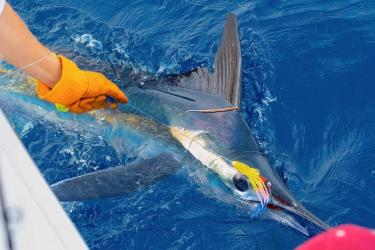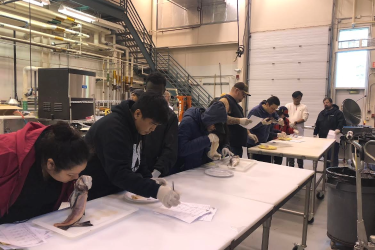A Changing Climate
Changing climate and oceans are affecting the nation’s valuable living marine resources and the people, businesses, and communities that depend on them. Warming oceans, rising seas, extreme weather events, and ocean acidification are impacting the distribution and abundance of species and the structure of marine and coastal ecosystems in many regions. These impacts are expected to increase and there is much at risk.
Expected Changes in the Southeast
A number of climate-related impacts have been observed in the Southeast region which spans from Texas to North Carolina, and includes the U.S. Caribbean. Species distribution shifts, coral bleaching and disease, extreme precipitation events leading to freshwater diversions and marine mammal mortality, changes in tropical cyclone dynamics, and more intense harmful algal blooms (HAB), are just a few. The Southeast Fisheries Science Center (SEFSC) and Southeast Regional Office (SERO) developed the first Regional Action Plans (RAPs) for the Gulf of Mexico (GMRAP) in 2016 and the Southeast United States Continental Shelf (S-RAP) in 2020. These RAPs highlighted some of the expected changes to the region and identified priority climate-related actions to pursue. Since 2016, significant progress has been made to address those actions, but more work remains.
Priority Actions
The updated Southeastern Regional Action Plan identifies priority actions to continue to implement the NOAA Fisheries Climate Science Strategy and advance climate-informed decision making, resilience and adaptation in the Southeast U.S. Continental shelf, Gulf of Mexico, and U.S. Caribbean. A selection of the actions identified in the Regional Action Plan are listed below. See the full document for additional details.
Build Science Infrastructure and Track Change (NCSS Objectives 6, 7)
- Build Capacity: Identify the staffing resources (full time employees, contractor services, cooperative research programs) needed to conduct the work of this Action Plan.
- Strategic Planning: Host virtual climate change workshop with partners in the region by end of FY24.
- Support application and development of the Climate, Ecosystems, and Fisheries Initiative.
- Establish a facility to settle, rear, and grow corals to support production of novel genotypes and climate research on different life history stages of corals.
- Identify Caribbean-focused staff to participate in the SERO/SEFSC climate change team.
- Increase awareness and utility of ecosystem status reports (ESR), climate vulnerability assessments (CVAs), and other climate tools for use by managers and stakeholders.
- Host a National Conservation Training Center climate change course to increase capacity to develop and implement climate-informed advice and resource management.
- Develop a comprehensive and collaborative monitoring program to track and deliver information on changing marine and coastal ecosystems.
- Complete an ecosystem status report for the U.S. South Atlantic region.
- Promote the Acropora cervicornis Data Coordination hub (AcDC) to maximize participation and collaboration among coral restoration practitioners and researchers.
- Conduct broad-scale, multi-platform, multi-species surveys of marine mammal, sea turtle, and seabird abundance and distribution, in the Gulf of Mexico and the southeastern Atlantic. Implement surveys in the Caribbean if additional funding is available.
- Conduct CVAs for Habitats and Atlantic HMS.
Understand Mechanisms and Project Future Conditions (NCSS Objectives 4, 5)
- Research impacts of climate-induced shifts in estuarine habitats (e.g., displacement of salt marsh by black mangroves) on the early life history stages of offshore stocks.
- Study impacts of climate variability and changing ocean dynamics on the recruitment of economically and ecologically important fishes across the Gulf of Mexico and Southeast US Continental Shelf with the intent of informing fisheries management.
- Leverage long-term demographic monitoring of Acropora palmata in Upper Florida Keys to understand impacts of climate on ESA-listed coral populations and inform restoration efforts.
Inform Management (NCSS Objectives 1-3)
- Partner with the Northeast Region Coordinating Council, NOAA Fisheries headquarters, and Mid-Atlantic and Greater Atlantic Regions to conduct East Coast Scenario Planning with stakeholders to better understand and respond to climate impacts on the Atlantic coast.
- Conduct Management Strategy Evaluations (MSEs) to determine robust harvest strategies that take into account stakeholder concerns.
- Continue to incorporate climate and ecosystem considerations into Essential Fish Habitat and Habitat Areas of Particular Concern designations, National Environmental Policy Act Reviews, restoration planning, and other management actions and products.
CONTACTS: Roldan Muñoz (roldan.munoz@noaa.gov), John Quinlan (john.a.quinlan@noaa.gov) or Lauren Waters (Lauren.Waters@noaa.gov).


